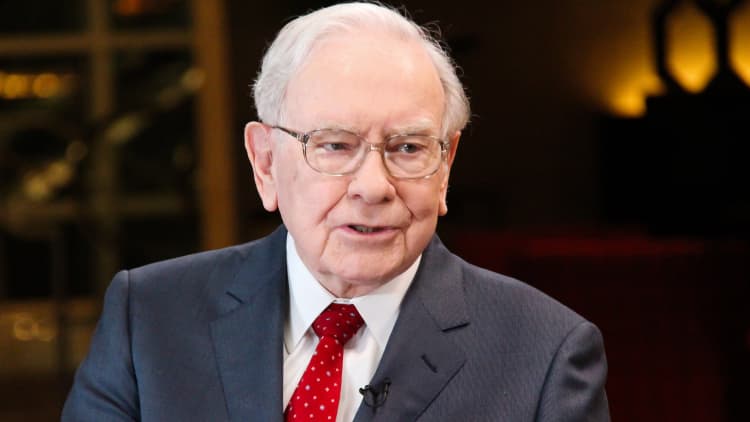Times are tough for billionaire investors. Warren Buffett's top stock picks aren't working — whether it's IBM or American Express, the Oracle can't seem to catch a break.
Buffett had his worst year since the financial crisis in 2015, and hedge fund great Bill Ackman of Pershing Square Capital Management had his worst year ever in 2015, thanks to, among other things, the dramatic fall in controversial drug company Valeant Pharmaceuticals, a top pick. David Einhorn of Greenlight Capital apologized to shareholders for a bad year and big bet gone bad on solar company SunEdison, which he failed to take profits in before the stock tanked. Though he hasn't given up on SunEdison and now has been given a board seat at the company.
The volatile markets were supposed to be a time for stock pickers to shine. But it hasn't worked out that way.
Einhorn said a few years ago, "It doesn't make sense to blindly follow me or anyone else into a stock. ... Do your own work."
Indeed, it's never been harder to be a billionaire investor, but here's the catch: It's never been easier, either.
And it's the latter that should have the attention of individual investors.
CNBC recently covered an interesting report from Goldman Sachs equity strategists who said that a concentrated list of hedge fund stock picks created by Goldman, the Hedge Fund VIP List, was just about the worst investment in the market right now. In fact, Goldman strategists advised investors looking for a viable equity strategy to do the exact opposite of the Hedge Fund VIP List — chase stocks that are among the least popular in hedge fund portfolios.
But here's the curious thing. Goldman Sachs recently filed for an exchange-traded fund based on — yes, you guessed it — the Hedge Fund VIP List.
Now before you cry foul and accuse Goldman of being up to Wall Street financial crash tricks, selling retail investors on an investment that Goldman executives are calling a dog internally, the divide between Goldman's short-term stock strategist call and Goldman Sachs Asset Management's ETF plans may not be a divide at all.
As noted in the recent CNBC article on the recent Goldman anti-hedge "conviction list" market advice, "What Goldman calls its 'VIP' list, or the one that includes the 50 most-owned stocks, has beaten the S&P 500 on a quarterly basis 64 percent of the time since 2001."
Goldman Sachs declined to comment on its plans to launch the "VIP List" ETF at a time when its analysts have released a report advising investors to do the opposite.
But Goldman isn't the only asset manager that believes an ETF based on the stock picks of investing giants is a good idea.
There are now at least seven ETFs offering a way to invest in the ideas of investing greats. Not surprisingly, after getting off to a good start, these ETFs have underperformed the market right alongside Buffett and Ackman more, and are they likely on a shorter leash than Buffett. He has earned his softly stated distaste for a short-term performance focus thanks to decades of excellence.
Billionaire investing ETFs
| Ticker | Name | YTD (%) | 1-year (%) | Annual fee (%) |
|---|---|---|---|---|
| GURU | Global X Guru | -6.98 | -17.99 | 0.75 |
| GURI | Global X Guru Int'l | -6.66 | -20.77 | 0.75 |
| ACTX | Global X Guru Activist | -2.19 | *-16.36 | 0.75 |
| IBLN | Direxion iBillionaire | -3.91 | -10.49 | 0.65 |
| ALFA | AlphaClone Alternative Alpha | -7.98 | -22.63 | 0.95 |
| ALFI | AlphaClone Int'l ETF | -3.74 | NA | 0.95 |
| VALX | Validea Market Legends | -3.73 | -14.55 | 0.79 |
| SPY | SPDR S&P 500 | -2.01 | -3 | 0.09 |
| EFA | iShares MSCI EAFE | -4.72 | -11.07 | 0.34 |
(Chart source: XTF.com, *ACTX inception date was 4/29/2015)
"ALFA and GURU had actually done pretty well in the past few years (since their inception in 2012 through August last year)," said Neena Mishra, director of ETF research at Zacks Investment Research. Even the broader hedge fund industry underperformed the broader stock market, and only a few hedge fund managers delivered superior returns. These "cloning" ETFs, by focusing only on the best ideas from hedge fund stock pick securities filings (13Fs), were able to beat the market.
"Of late, these strategies have backfired," Mishra said. "Most hedge funds had concentrated positions in some of the high-flying stocks," she said.
In fact, all of these ETFs have done worse than the market over the past few months and significantly worse in the past one-year period.
"In the current environment, when stock market returns are expected to be quite low, it is difficult to say whether these ETFs will be able to justify their high expenses with their performance," Mishra said.
She said since these ETFs use securities filings that are backward-looking (it's the stock picks that a manager made in the previous quarter that appear in a 13F), the approach could face more challenges, because in the current market, hedge fund managers may be moving in and out of positions more quickly than would be typical.
Global X and Direxion, which offers the iBillionaire Index (IBLN) ETF, declined to comment.

Taking a look at these ETFs reveals some keys about how the greats invest, what mistakes can set even the greats back and most importantly, how those mistakes are not that different from the ones individual investors make.
1. Hedge funds chase performance and crowd into trades, too.
GURU was hurt most acutely by its pharmaceuticals stock exposure last year as top holdings, including Valeant, plummeted. And it's an instructive stock disaster, reminding investors that it's not just the masses that chase performance. Hedge fund managers crowd into the same trades, too.
Global X said in its 2015 annual review that pharmaceutical stocks were responsible for one-third of its underperformance of the S&P 500.
The hedge fund clone ETFs started off with good performance but the risk of piling into something every hedge funds owns is taking it on the chin when the tide is going out.
Top picks of the billionaire ETFs
| Ticker | No. 1 holding | No. 2 holding | No. 3 holding |
|---|---|---|---|
| GURU | Darling Ingredients | Cheniere Energy | Pandora Media |
| GURI | Petrobras | Banco Bradesco | TIM Participacoes |
| ACTX | Freeport McMoRan | Cheniere Energy | Hertz Global |
| IBLN | Apple | Abbvie | Allergan |
| ALFA | Amazon | Allergan | Microsoft |
| ALFI | Teva | Baidu | Shire |
| VALX | LendingTree | Abiomed | Edwards Lifesciences |
2. The art of going to cash isn't easy for anyone to master.
During the recent market volatility, many investors have thought about or went ahead to cash. There may be no tougher trade to time than the risk-off cash trade, and ALFA experienced that last year, which was a major contributor to its underperformance.
Maz Jadallah, founder and CEO of AlphaClone, said ALFA and ALFI are the only of the "cloning" ETFs that offer a hedging component. "We're trying to protect against a 30 percent to 40 percent drawdown," he said, adding that it's an idea designed for retail investors who suffered through 2001 or 2008.
He added: "We want to outperform on the long side but do a reasonably good job of protecting against permanent destruction of capital."
Investors' proclivity to go to cash, in fact, is a reason that Jadallah believes in the fund. He said it is important to protect against the behavioral risk of people getting out at the wrong time, and the data shows that investors do sell when scared, even though they should know better. By limiting the magnitude of a drawdown through the hedging option, AlphaClone wants to give those "scared" investors a way to hold stocks for the long term.
Since inception, AlphaClone reports that ALFA's daily total return has performed 12 percent better than the S&P 500.
But it's important to remember that it's not always going to be that much easier for managers to time the cash trade than it is for average investors. With a go-to-cash trade, an investor has to be right twice — on the way out of the market and on the way back in — and that can magnify the performance shortfall when the trade is timed wrong.
ALFA doesn't exactly "go to cash," but uses a dynamic hedge to short the market, which you can read about in more detail here and here.
3. Cloning the greats doesn't mean just buying the same stocks they do, but understanding what underpins their stock selection. But ... it's not just a stock or sector but an overall market philosophy that can fall out of favor.
VALX is the only of these ETFs that doesn't use securities filings of hedge fund managers for its stock selection. It uses a series of "guru-based" models to find its ideas.
"We can always tell you WHY we own the stock. The funds that clone based on 13F filings can't tell you the why," said Justin Carbonneau, managing partner at Validea Capital, who runs VALX.
But gurus — think of Benjamin Graham or Warren Buffett — can have an overall approach to the market that falls out of favor from time to time. Some of Buffett's top stock picks, which he invested in based on his core beliefs, are feeling that now.
Carbonneau said overall, the hedge fund clone peers have good track records and the recent performance shortfalls do show how varied the approaches are in this niche.
GURU got hit hard by a few names, and AlphaClone by its hedging position being implemented at the wrong time. The guru-based model approach allows VALX to go into smaller-cap stocks that don't even show up among top holdings of the top hedge funds and avoid the crowded trades. But VALX's focus on small-cap and value names has been a recent problem, simply because these stock approaches have been out of favor.
"In the last 12 months, what hasn't worked has been small caps and value is trailing growth by quite a bit," Carbonneau said. But he added, "By the way, that's contrary to what works best over time."
In periods when value is struggling and the average stock is down more than a market-cap weighted index like the S&P 500, VALX will tend to underperform, he said, but "over the long-run, we think there is more opportunity for stock pickers in less followed securities," he said.
Proof is in the ... Goldman?
AlphaClone's Jadallah said it's a good thing Goldman is coming into the space.
"We wan't Goldman to come out with this fund because we think it affirms the approach," he said.
Goldman has come into the ETF market recently with a series of funds that undercut existing ETF company fee levels. "It probably will be quite cheap," Jadallah said, but he added, "That's fine. People wont pay a fee unless you earn it and the level of outperfomance over time has exhibited that ALFA more than pays for its fee."
Paul Britt, senior ETF analyst at FactSet Research Systems, said while these hedge fund "copycats" aren't his cup of tea, they do take some reasonable steps, given their limitations. And they hold the appeal of "easy to understand," which is not all bad.
But on that last point, the recent challenges faced by these ETFs should remind investors that making hedge fund investing easy can sometimes be pretty hard.
Correction: This version corrects the name of the hedge fund holding a large position in solar company SunEdison. It is David Einhorn's Greenlight Capital.







